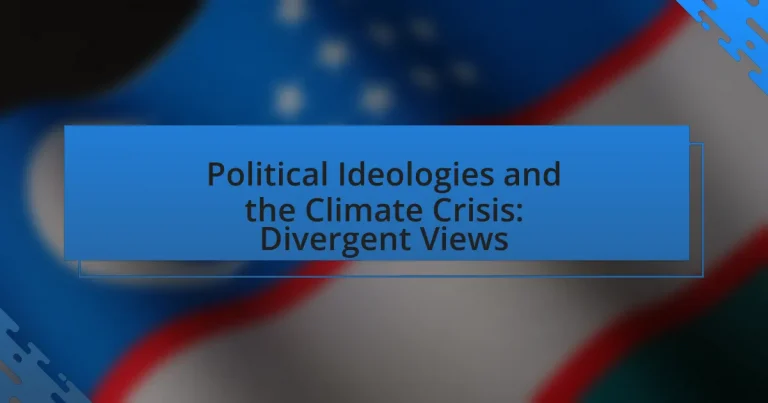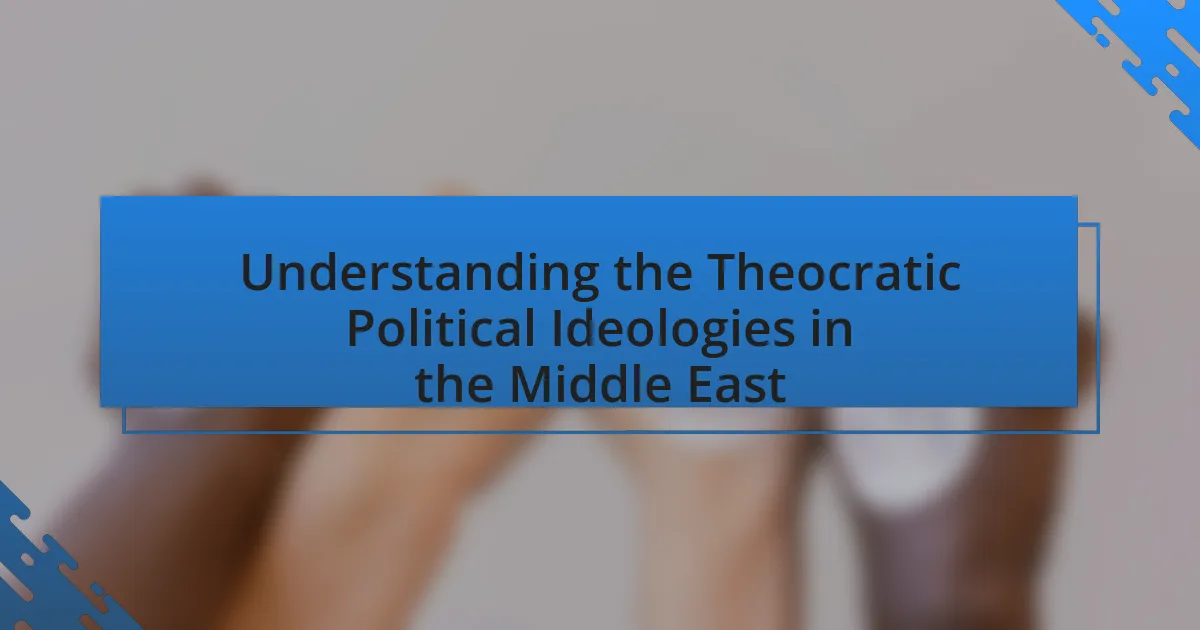The article examines the influence of key political ideologies—environmentalism, capitalism, socialism, conservatism, and liberalism—on perspectives regarding the climate crisis. It outlines how these ideologies shape public discourse and policy decisions, highlighting the contrasting approaches to climate action, economic growth, and social justice. The article further explores the implications of these divergent views on climate policy, public perception of climate science, and the effectiveness of climate legislation. Additionally, it discusses strategies for bridging ideological divides to foster collaboration and develop inclusive climate policies.
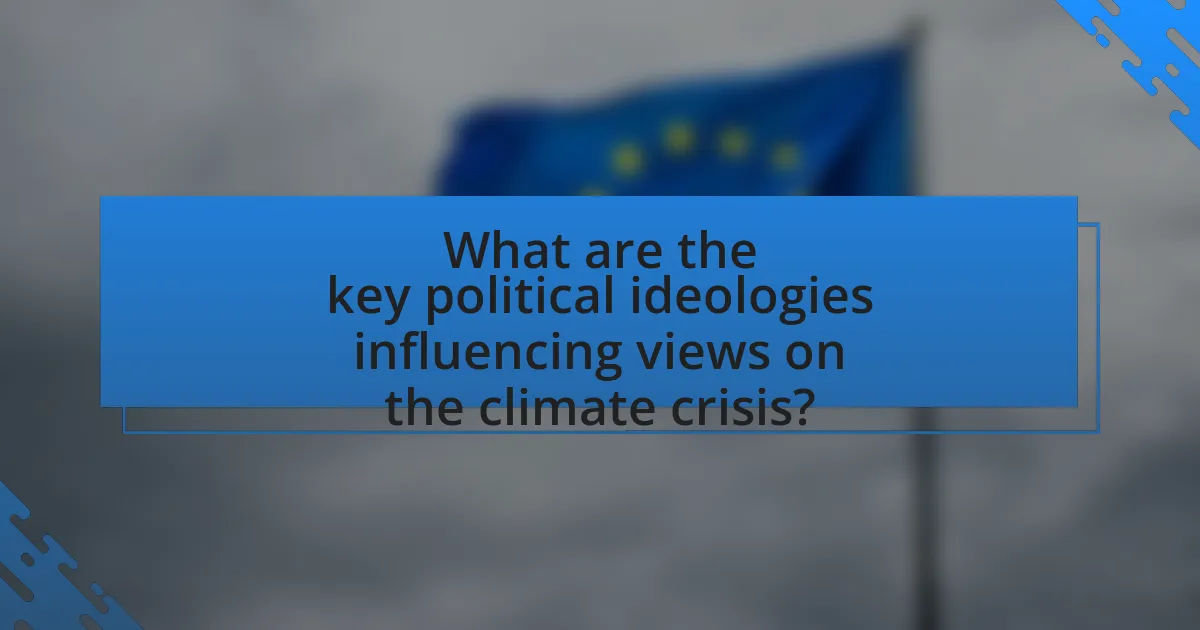
What are the key political ideologies influencing views on the climate crisis?
Key political ideologies influencing views on the climate crisis include environmentalism, capitalism, socialism, and conservatism. Environmentalism advocates for sustainable practices and policies to combat climate change, emphasizing the intrinsic value of nature and the need for systemic change. Capitalism often prioritizes economic growth, which can lead to environmental degradation, although some proponents advocate for green capitalism that integrates sustainability into market practices. Socialism emphasizes collective ownership and equitable resource distribution, promoting policies aimed at addressing climate justice and reducing inequality. Conservatism typically focuses on maintaining traditional values and may resist extensive regulatory measures, often prioritizing economic stability over aggressive climate action. These ideologies shape public discourse and policy decisions regarding climate action, reflecting diverse perspectives on the urgency and methods of addressing the climate crisis.
How do liberal ideologies approach the climate crisis?
Liberal ideologies approach the climate crisis by advocating for government intervention and international cooperation to address environmental issues. Liberals emphasize the importance of regulatory frameworks, such as emissions standards and renewable energy incentives, to mitigate climate change impacts. For instance, the Paris Agreement, which aims to limit global warming, reflects liberal values of collective action and responsibility among nations. Additionally, liberal ideologies often support investment in green technologies and sustainable practices, recognizing the economic opportunities presented by the transition to a low-carbon economy. This approach is backed by research indicating that proactive climate policies can lead to job creation and economic growth, as seen in studies by the International Renewable Energy Agency, which reported that renewable energy jobs could reach 24 million globally by 2030 if appropriate policies are implemented.
What policies do liberals advocate for addressing climate change?
Liberals advocate for comprehensive policies to address climate change, including transitioning to renewable energy sources, implementing carbon pricing, and enhancing regulations on emissions. These policies aim to reduce greenhouse gas emissions significantly, with the goal of achieving net-zero emissions by 2050. For instance, the Green New Deal, proposed in the U.S., emphasizes investment in clean energy infrastructure and job creation in sustainable industries. Additionally, studies show that transitioning to renewable energy could create millions of jobs while reducing reliance on fossil fuels, thus supporting both economic growth and environmental sustainability.
How do liberal values shape their response to environmental issues?
Liberal values shape responses to environmental issues by emphasizing individual rights, social justice, and collective responsibility. These values drive liberals to advocate for policies that prioritize sustainable development, regulatory frameworks to protect the environment, and equitable access to resources. For instance, the liberal approach often supports international agreements like the Paris Agreement, which aims to limit global warming and promote cooperation among nations. This commitment is reflected in the liberal belief that environmental protection is essential for ensuring the well-being of future generations and marginalized communities, as evidenced by studies showing that environmental degradation disproportionately affects low-income populations.
What is the conservative perspective on the climate crisis?
The conservative perspective on the climate crisis generally emphasizes skepticism about the extent and urgency of human-induced climate change, advocating for market-based solutions rather than regulatory approaches. Conservatives often argue that economic growth and energy independence should take precedence, suggesting that innovation and technology can address environmental issues without heavy government intervention. For instance, many conservatives support the development of clean energy technologies through private investment rather than government mandates, reflecting a belief in the efficiency of the free market. This viewpoint is supported by data indicating that the U.S. has significantly reduced carbon emissions through natural gas and technological advancements, rather than through stringent regulations.
How do conservatives prioritize economic growth in relation to climate action?
Conservatives prioritize economic growth over climate action by advocating for policies that promote free market principles and limit government intervention. This approach is rooted in the belief that economic prosperity leads to innovation and technological advancements that can address environmental issues more effectively than regulatory measures. For instance, many conservatives argue that economic growth generates the resources necessary for investment in clean energy technologies, as evidenced by the significant funding allocated to renewable energy projects in the U.S. that have emerged from private sector initiatives. Additionally, conservative policies often emphasize energy independence and the utilization of domestic fossil fuel resources, which they argue can drive job creation and economic stability while addressing energy needs.
What are the common arguments against climate regulations from conservatives?
Conservatives commonly argue against climate regulations by asserting that such regulations can hinder economic growth and job creation. They believe that imposing strict environmental regulations can lead to increased costs for businesses, which may result in job losses and reduced competitiveness in the global market. Additionally, conservatives often claim that climate regulations can disproportionately affect lower-income individuals and families by raising energy prices and living costs. They also argue that the scientific consensus on climate change is not as settled as portrayed, suggesting that the potential economic impacts of regulations may outweigh the uncertain benefits of addressing climate change. Furthermore, conservatives advocate for market-based solutions rather than government intervention, emphasizing innovation and technological advancements as more effective means to address environmental issues.
How do socialist ideologies view the climate crisis?
Socialist ideologies view the climate crisis as a systemic issue rooted in capitalism and inequality. Socialists argue that the environmental degradation caused by capitalist practices necessitates a collective, democratic approach to resource management and production. They emphasize that addressing climate change requires not only environmental reforms but also social justice, advocating for policies that redistribute wealth and power to create sustainable practices. This perspective is supported by the recognition that marginalized communities often bear the brunt of climate impacts, highlighting the need for equitable solutions that prioritize the needs of all people over profit.
What role does social justice play in socialist climate policies?
Social justice is central to socialist climate policies, as these policies aim to address both environmental degradation and social inequalities. Socialist frameworks prioritize equitable distribution of resources and opportunities, advocating for marginalized communities disproportionately affected by climate change. For instance, socialist climate policies often include measures such as transitioning to renewable energy sources that are accessible to all, ensuring that low-income populations benefit from green jobs and sustainable practices. This approach is supported by research indicating that equitable climate action can lead to improved social outcomes, as seen in countries like Cuba, where community-based initiatives have successfully integrated social equity with environmental sustainability.
How do socialists propose to address the climate crisis differently?
Socialists propose to address the climate crisis through systemic change, emphasizing the need for public ownership of resources and industries to prioritize environmental sustainability over profit. They argue that capitalism inherently drives environmental degradation due to its focus on short-term profits and growth, which leads to exploitation of natural resources. For instance, socialist frameworks advocate for transitioning to renewable energy sources and implementing strict regulations on pollution, which can be more effectively enforced under public ownership. Historical examples, such as the nationalization of energy sectors in various countries, demonstrate that state control can facilitate comprehensive environmental policies that prioritize long-term ecological health over immediate economic gains.
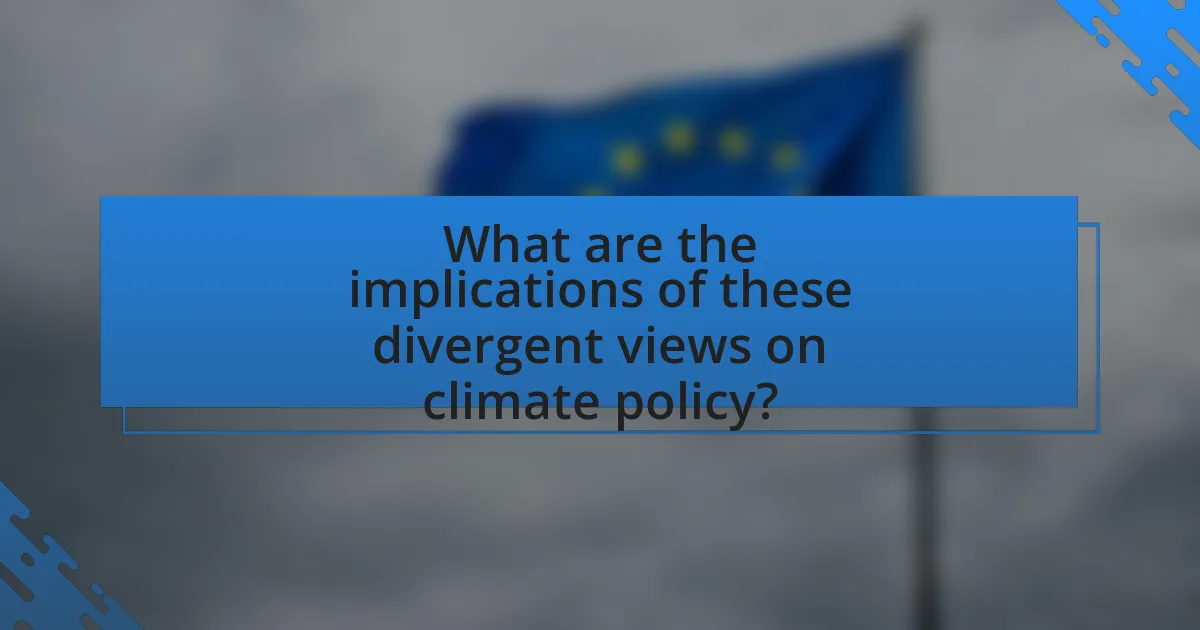
What are the implications of these divergent views on climate policy?
Divergent views on climate policy lead to significant implications for environmental action and governance. These differing perspectives can result in fragmented policy approaches, where some regions may adopt aggressive climate measures while others may resist or roll back regulations, ultimately hindering global efforts to combat climate change. For instance, countries prioritizing economic growth over environmental protection may delay necessary transitions to renewable energy, exacerbating greenhouse gas emissions. Additionally, conflicting ideologies can create political polarization, making it challenging to achieve consensus on international agreements, such as the Paris Agreement, which relies on collective commitment to emission reduction targets. This lack of unity can undermine the effectiveness of climate initiatives and slow progress toward sustainable development goals.
How do political ideologies affect public perception of climate science?
Political ideologies significantly influence public perception of climate science, with individuals identifying as conservative often expressing skepticism towards climate change, while those identifying as liberal tend to accept the scientific consensus. Research indicates that conservative media outlets frequently downplay climate issues, leading to lower levels of concern among conservative audiences. For instance, a study published in “Environmental Politics” by Dunlap and McCright (2010) found that political affiliation is a strong predictor of climate change beliefs, with conservatives more likely to reject climate science compared to liberals. This ideological divide shapes public discourse and policy responses to climate change, reinforcing existing beliefs and hindering collective action.
What role does misinformation play in shaping ideological views on climate change?
Misinformation significantly influences ideological views on climate change by distorting facts and creating confusion among the public. This distortion often leads individuals to adopt beliefs that align with their pre-existing political ideologies rather than scientific consensus. For instance, studies have shown that exposure to misinformation can increase skepticism about climate change, particularly among conservative audiences, as evidenced by research from the Yale Program on Climate Change Communication, which found that misinformation campaigns can lead to a 20% increase in climate change denial among specific demographic groups. This manipulation of information not only shapes personal beliefs but also affects public policy and collective action on climate issues.
How do ideological beliefs influence individual actions towards climate change?
Ideological beliefs significantly influence individual actions towards climate change by shaping perceptions of environmental responsibility and the urgency of climate action. For instance, individuals with progressive ideologies often advocate for strong governmental intervention and support policies aimed at reducing carbon emissions, reflecting a belief in collective responsibility for environmental stewardship. In contrast, those with conservative ideologies may prioritize economic growth and personal freedom, leading to skepticism about climate change and resistance to regulatory measures. Research indicates that political affiliation correlates with climate change beliefs; a study by Leiserowitz et al. (2018) found that 70% of liberal Democrats view climate change as a serious threat, compared to only 25% of conservative Republicans. This divergence in beliefs directly translates into varying levels of engagement in climate action, such as participation in protests, support for renewable energy initiatives, or advocacy for policy changes.
What are the consequences of ideological divides on climate legislation?
Ideological divides significantly hinder the effectiveness of climate legislation by creating polarization that obstructs consensus-building. For instance, in the United States, partisan disagreements have led to stalled initiatives such as the Green New Deal, which faced opposition primarily from conservative lawmakers who prioritize economic growth over environmental regulations. This division results in inconsistent policies across different administrations, undermining long-term climate goals and creating uncertainty for businesses and investors. Additionally, ideological divides can lead to public misinformation and reduced public support for climate action, as seen in surveys indicating that individuals’ beliefs about climate change often align with their political affiliations.
How do partisan conflicts hinder effective climate action?
Partisan conflicts hinder effective climate action by creating divisions that obstruct consensus on environmental policies. These conflicts often lead to legislative gridlock, where opposing political parties prioritize their ideological agendas over collaborative solutions to climate change. For instance, in the United States, the stark divide between Democrats and Republicans has resulted in inconsistent climate policies, with significant shifts occurring with each change in administration. This inconsistency undermines long-term climate strategies and investments, as seen in the withdrawal from the Paris Agreement by the Trump administration, which was reversed by the Biden administration. Such partisan disputes not only delay urgent climate initiatives but also diminish public trust in government efforts to address climate issues, ultimately impeding progress toward effective climate action.
What examples illustrate the impact of ideology on climate policy outcomes?
The impact of ideology on climate policy outcomes is illustrated by the contrasting approaches of the United States and European Union. In the U.S., the Trump administration’s withdrawal from the Paris Agreement in 2017 reflected a conservative ideology prioritizing economic growth over environmental regulations, resulting in a rollback of numerous climate policies. Conversely, the European Union has embraced a progressive ideology, committing to ambitious climate targets such as the European Green Deal, which aims for carbon neutrality by 2050. This ideological commitment has led to the implementation of stringent emissions regulations and investment in renewable energy. These examples demonstrate how differing political ideologies directly shape national climate policies and their effectiveness in addressing climate change.
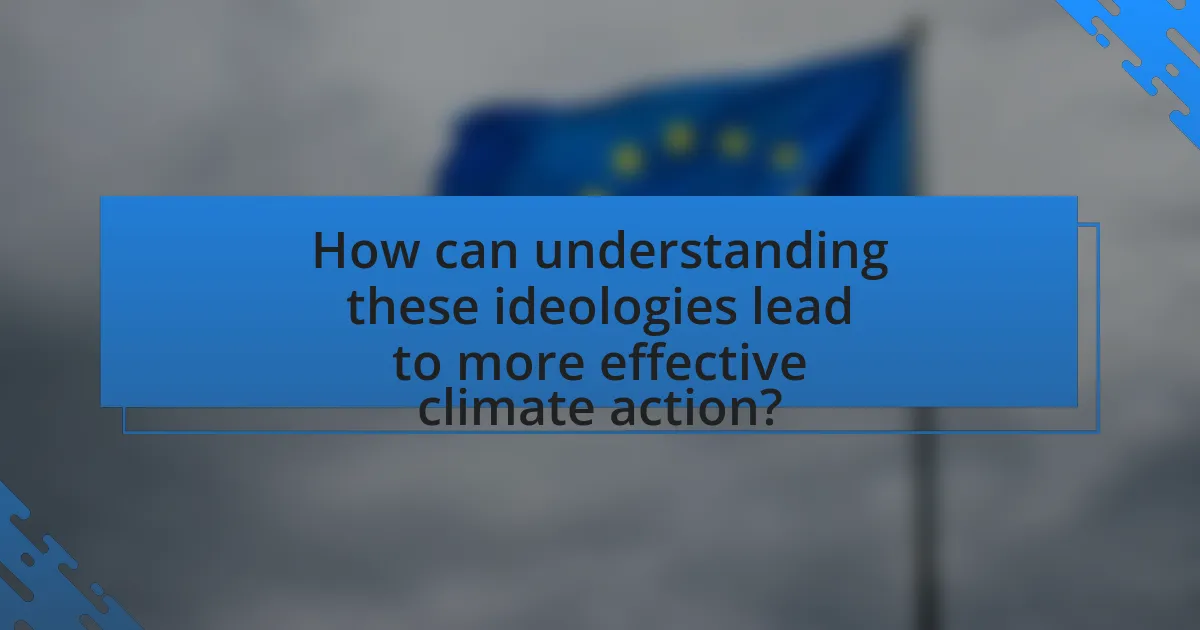
How can understanding these ideologies lead to more effective climate action?
Understanding political ideologies can lead to more effective climate action by aligning strategies with the values and beliefs of different groups. For instance, recognizing that conservative ideologies often prioritize economic growth can facilitate the development of market-based solutions to climate change, such as carbon trading systems. Conversely, understanding progressive ideologies that emphasize social justice can drive policies that address climate impacts on vulnerable communities. Research shows that tailored communication strategies that resonate with specific ideological beliefs can enhance public engagement and support for climate initiatives, as evidenced by studies from the Yale Program on Climate Change Communication, which highlight the importance of framing climate issues in ways that connect with diverse audiences.
What strategies can bridge the ideological divide on climate issues?
Collaborative dialogue and inclusive policymaking are effective strategies to bridge the ideological divide on climate issues. Engaging stakeholders from diverse political backgrounds in open discussions fosters mutual understanding and encourages the sharing of perspectives. Research indicates that bipartisan initiatives, such as the Climate Solutions Caucus in the U.S. Congress, have successfully brought together members from both parties to address climate change collaboratively. Additionally, emphasizing shared values, such as economic growth and public health, can create common ground, making climate action more palatable across the political spectrum.
How can dialogue between differing political groups enhance climate solutions?
Dialogue between differing political groups can enhance climate solutions by fostering collaboration and integrating diverse perspectives. When political factions engage in constructive discussions, they can identify common ground and shared goals, which is essential for developing comprehensive climate policies. For instance, bipartisan initiatives in the United States, such as the Energy Policy Act of 2005, demonstrate how collaboration can lead to significant advancements in renewable energy and energy efficiency. Additionally, dialogue can help mitigate polarization, allowing for more innovative solutions that consider economic, social, and environmental factors, ultimately leading to more effective climate action.
What role do grassroots movements play in uniting diverse ideologies for climate action?
Grassroots movements play a crucial role in uniting diverse ideologies for climate action by fostering inclusive dialogue and collaboration among various groups. These movements often bring together individuals from different political, social, and economic backgrounds, creating a platform for shared goals and collective action. For instance, the global climate strikes initiated by youth activists have successfully mobilized people across the political spectrum, demonstrating that climate action transcends ideological boundaries. Research shows that grassroots initiatives can effectively bridge divides by emphasizing common values, such as the need for a sustainable future, which resonates with a wide audience. This unification is evidenced by the participation of diverse organizations, from environmental NGOs to labor unions, in campaigns advocating for climate policies, illustrating the power of grassroots movements to create a cohesive front for climate action.
What best practices can be adopted to foster collaboration across ideologies?
To foster collaboration across ideologies, establishing open communication channels is essential. Open communication encourages dialogue and understanding, allowing individuals from different ideological backgrounds to express their views and concerns without fear of judgment. Research indicates that structured dialogues, such as facilitated discussions or workshops, can significantly enhance mutual respect and empathy among participants with divergent views. For instance, a study by the National Institute for Civil Discourse found that structured conversations can reduce polarization and promote collaborative problem-solving. Additionally, creating shared goals, such as addressing climate change, can unify individuals across ideologies, as evidenced by various bipartisan initiatives aimed at environmental sustainability.
How can policymakers engage with various ideological perspectives to create inclusive climate policies?
Policymakers can engage with various ideological perspectives by fostering dialogue and collaboration among stakeholders to create inclusive climate policies. This approach involves actively seeking input from diverse groups, including environmentalists, business leaders, and community representatives, to ensure that multiple viewpoints are considered. For instance, the United Nations Framework Convention on Climate Change (UNFCCC) emphasizes the importance of inclusive participation in climate negotiations, which has led to more comprehensive agreements that reflect a range of interests. By utilizing participatory processes, such as public consultations and stakeholder workshops, policymakers can build consensus and develop policies that address the concerns of different ideological factions, ultimately leading to more effective and equitable climate action.
What lessons can be learned from successful bipartisan climate initiatives?
Successful bipartisan climate initiatives demonstrate the importance of collaboration across political lines to achieve effective environmental policies. These initiatives often highlight the necessity of framing climate action in terms that resonate with diverse political ideologies, such as economic growth, job creation, and national security. For instance, the bipartisan support for the Energy Policy Act of 2005 showcased how aligning climate goals with energy independence and economic benefits can garner wider acceptance. Additionally, successful initiatives often involve stakeholder engagement, ensuring that various interest groups, including businesses and local communities, have a voice in the process. This inclusive approach fosters trust and shared ownership of climate solutions, ultimately leading to more sustainable and enduring policies.
